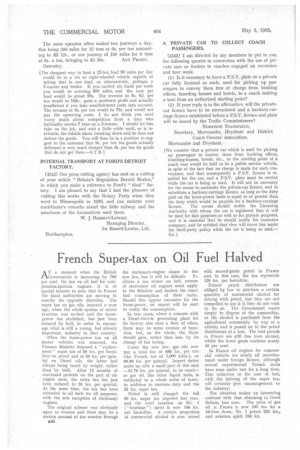French Super-tax on Oil Fuel Halved
Page 54

If you've noticed an error in this article please click here to report it so we can fix it.
AT a moment when the British Government is increasing by 700 per cent, the tax on oil fuel for compression-ignition engines, it is of special interest to note that in France the fiscal authorities are moving in exactly the opposite direction. The super tax on gas oils, imposed a year ago, when the whole system of motor taxation was revised and the horsepower tax abolished, has just been reduced by half, in order to encourage what is still a young, but already important, industry in. that country.
When the horse-power tax on all motor vehicles was removed, the Finance Ministry imposed a "replacement" super tax of 50 fcs. per hectolitre on petrol and of 50 fcs. per quintal on Diesel oils, the latter fuel always being taxed by weight, rather than by bulk. After 12 months of continued protests on the part of oilengine users, the extra tax has just been reduced to 25 fcs. per quintal. At the same time, the tax has been extended to oil fuels for all purposes, with the sole exception of stationary engines.
The original scheme was obviously open to evasion and there may be a certain amount of tax evasion through 840 the stationary-engine clause in the new law, but it will be difficult. To obtain a tax rebate on fuel, owners of stationary oil engines must apply to the Ministry and declare the exact fuel consumption of their units. Should this appear excessive for the horse-power, an expert will be sent to verify the consumption.
In rare cases, where a concern with a Diesel-electric generating plant for its factory also runs a fleet of oilers, there may be some evasion of taxation, but, on the whole, the State should gain, rather than lose, by its change of tax rating.
Under the new law, gas oils now pay a total tax ot 688 fcs. per ton (the French ton of 1,000 kilos.), or 68.80 leg, per quintal. Import duties make up only a small part of this sum —31.70 fcs. per quintal, to be exactas gas oil, like other liquid fuels, is subjected to a whole series of taxes, in addition to customs duty and the 25 fcs. super tax.
Petrol is still charged the full 50 fcs. super tax imposed last year, and the total taxation on No. 1 (" tourisme") spirit is now 156 fcs. per hectolitre. A certain proportion of commercial alcohol is now mixed with second-grade petrol in France and, in this case, the tax represents 129 fcs. per hectolitre.
French petrol distributors are obliged by law to purchase a certain quantity of commercial alcohol for mixing with petrol, but they are not compelled to use it if they do not wish to do so. The Government wants simply to dispose of the commodity, as the alcohol is purchased from the agricultural community by way of a subsidy and is passed on to the petrol distributors at a loss. The best petrols in France are still free from alcohol, whilst the lower grade contains nearly 40 per cent.
In France oil engines for commercial vehicles are nearly all manufactured under foreign licence, although several experimental French units have been under test for a long time. This reduction in the cost of fuel, with the halving of the super tax, will certainly give encouragement to the industry.
The situation makes an interesting contrast with that obtaining in Great Britain, 'just now. The price of gas oil :n France is now 143 fcs. for a 50-litre drum, No. 1 petrol 220 fcs., and aviation spirit 250 fcs.




























































































